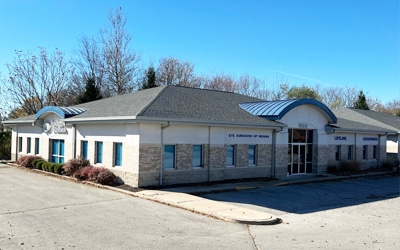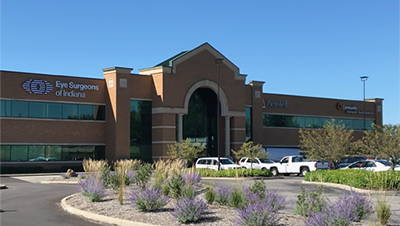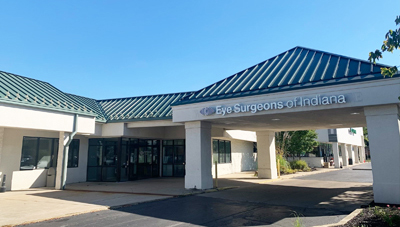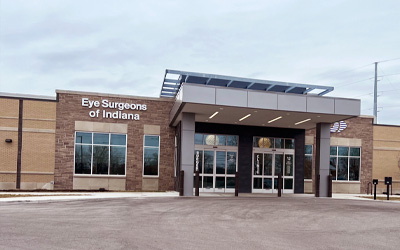Dry Eye
Dry eye is a condition in which there are insufficient tears to lubricate and nourish the eye or when the essential oils to protect our tear film are not being produced properly. People with dry eyes may experience symptoms of irritated, gritty, scratchy, or burning eyes, a feeling of something in their eyes, excess watering, and blurred vision. Advanced dry eyes may damage the front surface of the eye and impair vision.
We specialize in effective dry eye treatment in Indiana to help you get relief from inflammation and discomfort.
Call for a dry eye evaluation at 317-841-2020.
Visit our online store for dry eye products.
What causes dry eyes?
Meibomian gland dysfunction (MGD) is a common eye condition that triggers dry eyes.
Left untreated, dry eye syndrome can cause fatigue, redness, blinking, itchiness, and blurred vision. The sooner you get treatment for dry eye caused by MGD, the better.
There are various factors that can increase your risk of getting MGD:
- Age: Dry eye is a part of the natural aging process. The majority of people over age 65 experience some symptoms of dry eyes.
- Gender: Women are more likely to develop dry eyes due to hormonal changes caused by pregnancy, the use of oral contraceptives, and menopause. Keep in mind, however, MGD is common among all genders.
- Medications: Certain medicines, including antihistamines, decongestants, blood pressure medications and antidepressants, can reduce the amount of tears produced in the eyes
- Medical Conditions: Persons with rheumatoid arthritis, diabetes and thyroid problems are more likely to have symptoms of dry eyes. Also, problems with inflammation of the eyelids (blepharitis), inflammation of the surfaces of the eye, or the inward or outward turning of eyelids can cause dry eyes to develop.
- Eyelid Hygiene: Often debris from the eyelashes and the lid margins are the culprit of contributing to MGD. Lid hygiene is key to maintaining health of the meibomian glands and surface of the eye so both the lashes and lid margins should be cleaned regularly.
- Environmental Conditions: Exposure to smoke, wind, ceiling fans, and dry climates can increase tear evaporation resulting in dry eye symptoms. Failure to blink regularly, such as when staring at a computer or phone screens for long periods of time, can also contribute to drying of the eyes.
- Other Factors: Long term use of contact lenses can be a factor in the development of dry eyes. Refractive eye surgeries, such as LASIK, can cause decreased tear production and dry eyes.
How is dry eye and MGD diagnosed?
Dry eye syndrome and MGD can be diagnosed through a comprehensive eye examination. Testing, with special emphasis on the evaluation of the quantity and quality of tears produced by the eyes and proper gland function may include:
- Patient history
- External examination of the eye, including lid structure and blink dynamics
- Evaluation of the eyelids and cornea using bright light and magnification
- Measurement of the quantity and quality of tears for any abnormalities
- Dynamic Meibomian Imaging to assess the health of the meibomian glands
- Tear testing to look for high salt content (hyperosmolarity) or inflammatory markers on the surface of the eye
86% of Patients with Dry Eye Have MGD. It’s Treatable.
When the meibomian glands, the tiny glands located in the eyelids, do not sufficiently produce and release the oils needed for protecting and ensuring a healthy tear film, this is known as MGD. Often over time, due to a lack of blinking or general debris in the eye, these glands become blocked and stop producing the needed oil to protect the watery layer of the tear film. speedTest Early diagnosis is essential because if left untreated, the glands will deteriorate over time and there is no way to recover from gland loss. Getting MGD treatment as soon as possible will help protect stressed but still-functional meibomian glands.
MGD can occur at any age but is more prevalent in adults over 40. The increase of MGD is largely due to the common use of digital display devices today as we are teaching ourselves to blink less creating “evaporative stress”. Over time, the oil in the glands thickens, creating blockages of the gland opening and often oil production ceases.
Treating MGD
Treatment for MGD may include various methods, including at-home lid hygiene, prescription eye drops, and in-office procedures.
IPL, or Intense Pulsed Light, is a non-invasive and non-laser treatment for rosacea, dry eye, and meibomian gland dysfunction (MGD) that uses pulses of light to reduce inflammation, soften gland secretions, and rejuvenate the meibomian glands. Get more info about IPL.
iLux is a handheld device that applies heat and compression under direct visualization to remove gland blockages.
LipiFlow is an automated procedure that uses thermal heat pulsation to liquefy gland blockages and a light massaging action to remove those blockages.
TearCare delivers adjustable heat via an adhesive device that is placed on the upper and lower eyelids. Manual gland expression is performed after the contents of the glands have liquefied.
Why Choose Us?
Eye Surgeons of Indiana specializes in high-quality eye care in a caring and relaxing environment. Whatever eye condition you’re facing, our board-certified ophthalmologists and optometrists strive to provide you the best treatment possible.
Experience – Our team has performed over 100,000 procedures in the last 26 years, boasting complication rates well below the national average.
Technology – We use the finest lasers and specialty lenses, proven medical therapies, and cutting-edge digital imaging equipment.
Total patient comfort – Get treated in surgical suites and recovery rooms designed with your needs and comfort in mind.
Give us a call at (317) 841-2020 or fill out our contact form to schedule a consultation.










